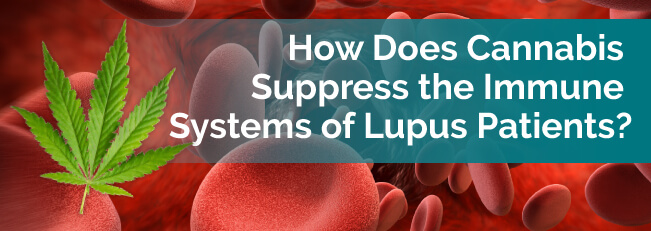
Lupus manifests in many forms, but no matter the symptoms, it always has the same cause. When someone has lupus, their autoimmune system attacks their healthy cells. It can affect any area of the body to any degree of severity.
To counteract lupus, many doctors prescribe immunosuppressants, which weaken the immune system. As you can imagine, while they reduce the damage done, they also make the patient more susceptible to illness and infection. They also only serve a single purpose.
While medical marijuana is known to relieve pain, reduce depression and anxiety and help sleep, researchers are discovering that we can add “surpass immunity” to that list.
In 2010, Hegde, Nagarkatti and Nagarkatti discovered that THC, one of the chemicals found in cannabis, has the potential for immunosuppressive use. When they administered THC to lab mice, it helped their natural immunosuppressive cells rapidly grow.
Nargarkatti and Nagarkatti were also part of a team that reviewed data on cannabinoids’ ability to reduce immune cells. Our brains make their own cannabinoids that get processed by two different receptors — cannabinoid receptor 1 (CB1) and cannabinoid receptor 2 (CB2). When cannabinoids interact with CB2, they kill some of the immune cells, suppressing the immune system and reducing inflammation.
Eisenstein went even further to say the data he reviewed “provides incontrovertible evidence that cannabinoids are immunosuppressive.” While many areas of scientific marijuana research have little information, there’s plenty of research on marijuana as an immunosuppressant. Even though THC often causes psychoactive symptoms, it can be safe when correctly used in a drug.
To put everything together, we have a part of our brain that takes in chemicals like the ones in marijuana. Adding more of these chemicals to one of them can kill some of our immune cells. While this isn’t always ideal for a patient, it’s great for lupus patients because it reduces the symptoms they experience.
However, we have one important factor to keep in mind. All the major studies conducted so far have been “preclinical,” or tested on animals rather than humans. Rodents and other lab animals can have similar brain biology, but they can’t replace the brain chemistry of a person.
So, the takeaway from this? Researchers think marijuana has a lot of promise for helping lupus patients feel better — we just need some clinical data to seal the deal. As more Americans recognize the legitimacy of marijuana as a medical treatment, we’ll get the resources and data we need to understand how to use it better.
Since lupus can affect so many parts of the body, doctors use medicine on a symptom-by-symptom basis in addition to the immunosuppressant treatment. Weed is an incredibly versatile drug — it can relieve multiple symptoms at one time and provides various treatments based on its strain.
Here are some of the lupus symptoms pot can help you with:
Now that you know how medical cannabis can help you manage your lupus symptoms, you need to get everything set up so you can take it. Every state has unique laws for medical marijuana, so consider the rules in your state before you get started. You’ll also need to find the right doctor and dispensary for you.
For more information about how cannabis can be used to treat Lupus, check out our resources: